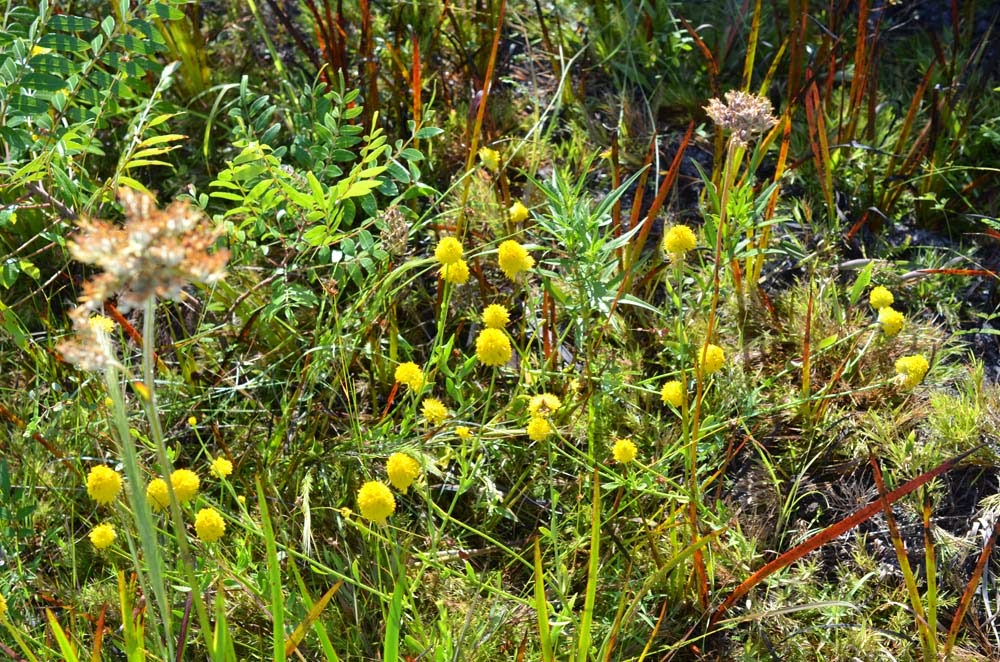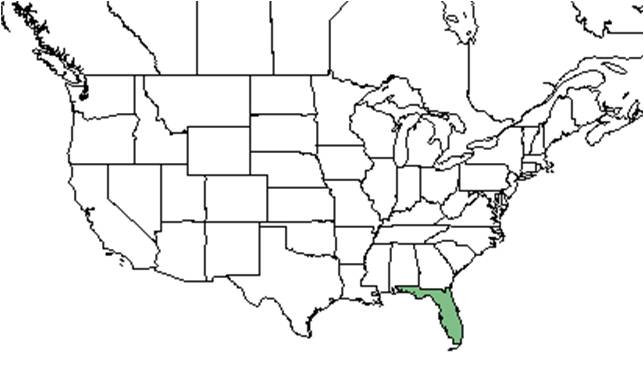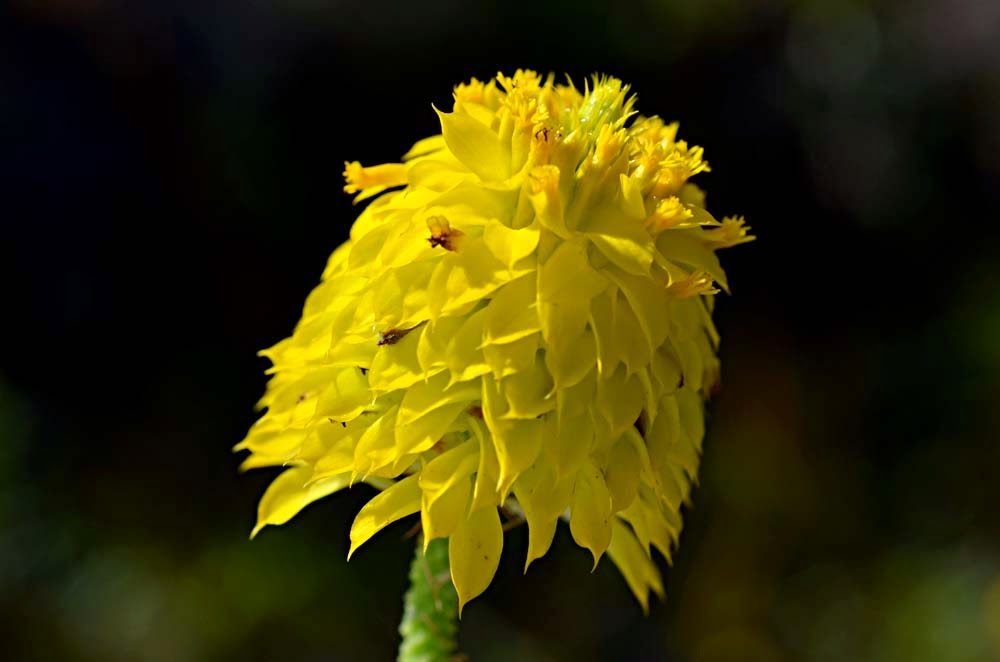Difference between revisions of "Polygala rugelii"
(→Pollination and use by animals) |
HaleighJoM (talk | contribs) (→Ecology) |
||
| Line 44: | Line 44: | ||
Following a fire, flowering of ''P. rugelii'' is conspicuous.<ref name="Abrahamson 1984">Abrahamson, W. G. (1984). "Species Responses to Fire on the Florida Lake Wales Ridge." American Journal of Botany 71(1): 35-43.</ref> | Following a fire, flowering of ''P. rugelii'' is conspicuous.<ref name="Abrahamson 1984">Abrahamson, W. G. (1984). "Species Responses to Fire on the Florida Lake Wales Ridge." American Journal of Botany 71(1): 35-43.</ref> | ||
| − | ===Pollination | + | ===Pollination=== |
The following Hymenoptera families and species were observed visiting flowers of ''Polygala rugelii'' at the Archbold Biological Station:<ref name="Deyrup 2015">Deyrup, M.A. and N.D. 2015. Database of observations of Hymenoptera visitations to flowers of plants on Archbold Biological Station, Florida, USA.</ref> | The following Hymenoptera families and species were observed visiting flowers of ''Polygala rugelii'' at the Archbold Biological Station:<ref name="Deyrup 2015">Deyrup, M.A. and N.D. 2015. Database of observations of Hymenoptera visitations to flowers of plants on Archbold Biological Station, Florida, USA.</ref> | ||
| Line 54: | Line 54: | ||
Thread-waisted wasps from the family Sphecidae: ''Ammophila pictipennis'' | Thread-waisted wasps from the family Sphecidae: ''Ammophila pictipennis'' | ||
| + | <!--===Herbivory and toxicology===<!--Common herbivores, granivory, insect hosting, poisonous chemicals, allelopathy, etc--> | ||
<!--===Diseases and parasites===--> | <!--===Diseases and parasites===--> | ||
Latest revision as of 14:12, 15 July 2022
| Polygala rugelii | |
|---|---|

| |
| Photo by Wayne Matchett, SpaceCoastWildflowers.com | |
| Scientific classification | |
| Kingdom: | Plantae |
| Division: | Magnoliophyta - Flowering plants |
| Class: | Magnoliopsida – Dicotyledons |
| Order: | Fabales |
| Family: | Polygalaceae |
| Genus: | Polygala |
| Species: | P. rugelii |
| Binomial name | |
| Polygala rugelii Shuttlw. ex Chapm. | |

| |
| Natural range of Polygala rugelii from USDA NRCS Plants Database. | |
Common name: Yellow milkwort
Contents
Taxonomic notes
Synonym: Pilostaxis rugelii (Shuttleworth ex Chapman) Small
It is named for the German botanist, Ferdinand Rugel, who collected plants in Florida during the early 1800s.[1]
Description
P. rugelii is an annual species, however, sometimes can be a biennial. In the spring, the irregular rosette is composed of spatulate leaves. The flower stalk arises in summer and the basal rosette will disappear. The stalk can reach 1 to 3 feet high and is often branched.[2]
Distribution
P. rugelii is endemic to the Florida peninsula.[2]
Ecology
Habitat
In the Coastal Plain in Florida, P. rugelii can occur in wiregrass/saw palmetto/pine associations, cypress bays and flatwood marshes. It has occurred in disturbed areas such as cleared pine flatwoods and a recently timber harvested bayhead. It grows in peaty-sandy soil. Associated species include wiregrass, saw palmetto, pine, and cypress.[3]
Polygala rugelii is an indicator species for the Central Florida Flatwoods/Prairies community type as described in Carr et al. (2010).[4]
Phenology
Flowers late summer to early fall.[2]
Fire ecology
Following a fire, flowering of P. rugelii is conspicuous.[5]
Pollination
The following Hymenoptera families and species were observed visiting flowers of Polygala rugelii at the Archbold Biological Station:[6]
Bees from the family Apidae: Mellisodes communis
Sweat bees from the family Halictidae: Augochlorella gratiosa
Leafcutting bees from the family Megachilidae: Megachile brevis pseudobrevis
Thread-waisted wasps from the family Sphecidae: Ammophila pictipennis
Conservation, cultivation, and restoration
Cultural use
Large doses of this species act as a strong laxative.[7]
Photo Gallery
Flowers of Polygala rugelii Photo by Wayne Matchett, SpaceCoastWildflowers.com
References and notes
- ↑ [[1]]All Things Plants. Accessed: February 20, 2016
- ↑ 2.0 2.1 2.2 [[2]] Native Florida Wildflowers. Accessed: February 22, 2016
- ↑ Florida State University Robert K. Godfrey Herbarium database. URL: http://herbarium.bio.fsu.edu. Last accessed: November 2015. Collectors: A. Gholson Jr., Robert K. Godfrey, R.A. Norris, A.G. Shuey. States and Counties: Florida: Gilchrist, Manatee, Volusia. Compiled by Tall Timbers Research Station and Land Conservancy.
- ↑ Carr, S.C., K.M. Robertson, and R.K. Peet. 2010. A vegetation classification of fire-dependent pinelands of Florida. Castanea 75:153-189.
- ↑ Abrahamson, W. G. (1984). "Species Responses to Fire on the Florida Lake Wales Ridge." American Journal of Botany 71(1): 35-43.
- ↑ Deyrup, M.A. and N.D. 2015. Database of observations of Hymenoptera visitations to flowers of plants on Archbold Biological Station, Florida, USA.
- ↑ Austin D. 2002 Milkworts Discovering Florida's Ethnobotany with Dr. Dan Austin. Palmetto 21(2):10-11
